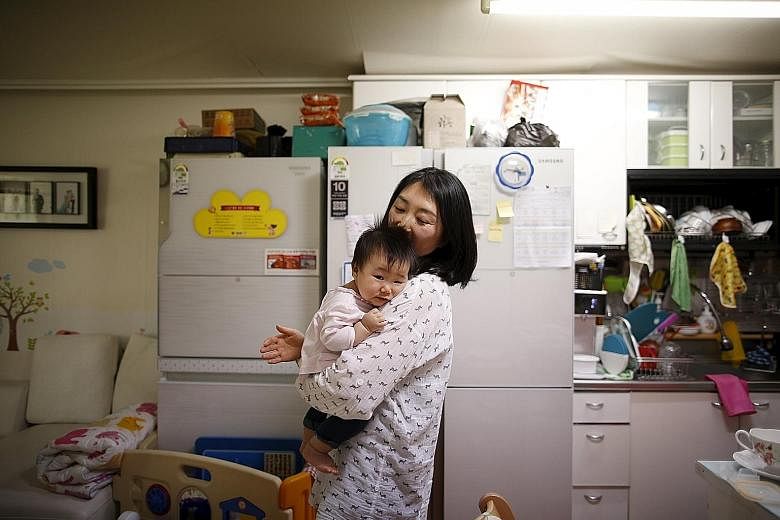SEOUL • Like more than half of South Korean mothers, Ms Kim Ju Yeon spent two weeks recuperating and relaxing in a healthcare centre with her newborn baby after she gave birth last June.
But her baby boy caught latent tuberculosis during their stay, one of 30 infants who were infected by a nursing assistant.
"I never thought my baby could get sick," said Ms Kim, 36, who sued the centre's owner, seeking compensation, along with the families of 79 other babies similarly infected or treated to prevent infection.
Growing concern over infection risks in such facilities has prompted South Korea to propose tighter regulation of the sometimes luxurious centres, which usually put babies in nurseries with other infants, separate from their mothers.
The government's new rules will encourage shared rooms for mothers and babies, and mandate tuberculosis tests for new hires.
"We are supplementing current laws to send a strong message for the safety of the postpartum care centres from infections," health ministry official Woo Hyang Jae told Reuters.
The care centres have caught on so dramatically, since emerging in the late 1990s, that entrepreneurs are taking the business model overseas, an effort backed by the government.
The centre where Ms Kim stayed is run by YK Dongrami, South Korea's biggest postnatal care brand, which has 16 domestic centres and five in China. In August, the company apologised on its website for the incident.
South Korea had 610 for-profit postnatal facilities last year, up from 377 in 2007.
But the health ministry says the centres are vulnerable to infection and hamper mother-child bonding.
The government says 265 babies caught infections, from respiratory to diarrhoeal diseases, in the first half of 2015, the latest data available. That figure compares with just 88 in all of 2014.
Another centre suspended operations this year after 15 babies caught rotavirus, which can cause diarrhoea. No deaths have been traced to South Korea's postnatal centres in recent years.
Two weeks' stay at a centre typically costs US$2,000 (S$2,700) - with the plushest costing as much as US$20,000 - and includes massages for the mothers, and sometimes yoga, along with babycare lessons. At feeding time, nurses take babies to their mothers or put them together in special rooms.
Most of the time, nurses look after the babies grouped about 10 or 20 in a room, though the World Health Organisation advises that mother and child share a room to promote bonding.
The centres have evolved from South Korea's tradition of "sanhujori", in which experienced mothers or mothers-in-law help new mothers care for their infants.
"We don't have any family living nearby. Realistically our only option was to go to a care centre," said Ms Jeong Bo Mi, 37, who is among the plaintiffs. Her baby was treated as a preventive measure, and eventually tested negative for latent tuberculosis.
REUTERS

